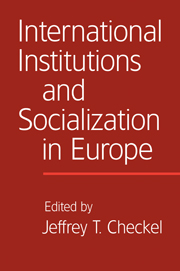Preface
Published online by Cambridge University Press: 06 November 2009
Summary
Over the past decade, there has been a notable and welcome shift in research on international institutions. If early work was preoccupied with showing that institutions mattered in world politics, more recent research explores the processes, mechanisms, and conditions under which they matter.
The present collection is part of this trend. Since the path-breaking work of Karl Deutsch on security communities and Ernst Haas on European integration, it has been abundantly clear that international institutions can – under certain conditions – create senses of community and belonging beyond the nation state. Put differently, they may socialize. However, the mechanisms and processes underlying such socialization dynamics have been less clear. It is precisely the latter on which this volume focuses.
In exploring these mechanisms of international community building, our emphasis is resolutely eclectic. Rationalism is the social theory of choice for some contributors, while others are more comfortable with social constructivism. Still others combine the two. This problem-driven perspective and the theoretical bridge building it begets are the cutting edge in work on international institutions and in international relations (IR) theory more generally. For sure and as our two concluding essays argue, middle-range theory of this sort faces challenges of its own, especially at the levels of research design and methods. Yet, by giving us more fine-grained arguments on precisely how international institutions matter, such an approach sheds crucial light on the complex relation between states and institutions, between rational choice and social constructivism, and, in our case, between Europe and the nation state.
- Type
- Chapter
- Information
- International Institutions and Socialization in Europe , pp. vii - viiiPublisher: Cambridge University PressPrint publication year: 2007
- 1
- Cited by

